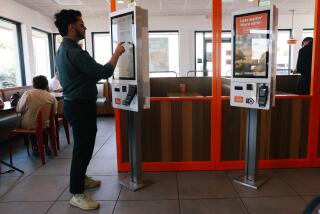Turkey, Stuffing, Mashed Potatoes and Pie . . . To Go, Please
- Share via
Now really.
Amid the holiday madness this week, you’re expected to scrub the house from top to bottom (or maybe just the guest room), crawl down the 405 to pick up your in-laws at the airport, shop for that book on feng shui and a Beanie Baby or the nearest equivalent, and then cook enough yams to feed the 82nd Airborne Division? Please.
At least one alternative has emerged, however, to lessen the impact when that lumbering ogre of a tradition, the family holiday dinner, comes barreling into your dining room and shreds what remains of your sanity. Have the damned thing catered.
Witness the latest trend in winter stress relief, a little notion that the restaurant industry likes to call “home meal replacement.” You call your fave upscale market or posh bistro a few days before the big day, order your gourmet feast, pick it up the day of, pop it in the oven to reheat, and wham--a meal for 10 that’ll turn Martha Stewart greener than last year’s fruitcake.
Michael Sansolo, senior vice president of the Washington-based Food Marketing Institute, pronounces such behavior to constitute nothing less than “the biggest trend in eating.”
Industry research shows that 92% of the nation’s supermarkets now offer prepared meals, and Sansolo believes ready-made holiday feasts have spread to the mainstream. Sales of prepared meals cooked by restaurants are also enjoying steady growth--and will make up nearly one-third of restaurant revenue in five years, the institute estimates.
“I don’t think anybody cooks anymore,” says Bob Spivak, CEO of Brentwood-based Grill Concepts, owner of the Daily Grill chain. “Somebody could make a hell of a business turning ovens into planters.”
But while consumers are home this week tending the rhododendrons on their stoves, restaurant and supermarket chefs will be working overtime to fill orders.
At Zov’s Bistro & Bakery of Tustin, owner Zov Karamardian says she plans to beef up her eight-man kitchen staff with as many as five extra employees to fill her orders. The staff will start preparing Christmas meals Tuesday at 2 a.m., then stuff, glaze and peel around the clock until mid-Wednesday, when customers will arrive to pick up their entrees.
It’s overwhelming to assume responsibility for what is for some the most important meal of the year, she says, but she insists it’s a labor of love.
“It comes from the heart,” she said of her holiday menu. “I love it. I’m part of their family. They put their trust in our hands.”
For El Segundo-based Bristol Farms, that trust means having to prepare and ship 2,000 pounds of mashed potatoes last weekend, and 300-plus turkeys.
Bristol Farms is making dinner for 4,000. And food services director Mark Schloss says that’s just the beginning.
While fewer people appear willing to slave over a stove, “they’re still going to want a quality product. We’re right on the cutting edge.”
Schloss says orders are up 20% over those of last December, and figures that if the trend continues, America will bury the apparently tired tradition of home-cooked holiday meals entirely in a generation or so. Indeed, Sansolo of the Food Marketing Institute envisions a time when young adults will long for a traditional holiday meal “just like Mom used to buy.”
Restaurants and upscale grocers have offered such prepared fare for a decade or more, but only recently has “home meal preparation” blossomed in the industry. With the rise of the two-career couple and the fall of the culinary arts, researchers say, it was inevitable.
That doesn’t seem to bother Justin Rudd, 28, a Long Beach actor who has ordered dinner for 10 for $195 from the Tustin bistro.
“You don’t want me to cook,” warns Rudd, who had Thanksgiving prepared at the same bistro and plans to feed his friends this Christmas. “It’s great food. It’s a lot better than what I could do myself.”
But whither tradition?
Says Spivak: “There are things that are just more important in today’s society than cooking Christmas dinner.”
More to Read
Eat your way across L.A.
Get our weekly Tasting Notes newsletter for reviews, news and more.
You may occasionally receive promotional content from the Los Angeles Times.










